Peter MALONE
Saturday, 18 September 2021 19:28
Miniver Story, The
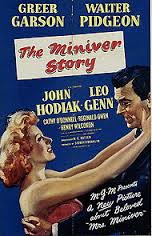
THE MINIVER STORY
UK, 1950, 104 minutes, Black and white.
Greer Garson, Walter Pidgeon, Cathy O'Donnell, John Hodiak, Leo Genn, Reginald Owen, Henry Wilcoxon, William Fox, Anthony O'Donnell.
Directed by H. C. Potter.
The Miniver Story, directed by H. C. Potter who made a number of pleasant comedies and dramas between the '30s and the '50s, is the sequel to William Wyler's Oscar winning and commercially successful Mrs. Miniver. Mrs. Miniver, released in 1942, made great impact during the war. Greer Garson won an Oscar for her performance and this was one of the several teamings with Walter Pidgeon. This film, made in 1950, capitalises on its predecessor but makes nowhere near the same impact. There is a re-creation of the atmosphere of the Miniver family. Greer Garson is at her radiant best and charming as Kay Miniver. Walter Pidgeon is again strongly supportive as her husband Clem.
However, the story of the post war years is slight and had been told many times by this. Cathy O'Donnell is quite sweet as their daughter Judy and the young James Fox (here called William Fox, later to appear in such films as The Servant, Thoroughly Modern Millie), is a precocious youngster. There is a strong M.G.M. supporting cast including John Hodiak, Leo Genn and a brief appearance by Peter Finch as a Polish soldier. The film also uses the perennial theme of a woman with a terminal illness facing death with great fortitude. The film was made in England with all M.G.M.'s customary gloss and style. In itself it is a pleasing if very tearful drama. For fans it is an interesting and moving postscript to Mrs. Miniver.
1. The popularity of Mrs. Miniver? Its awards and technical skill? Its emotional impact and propaganda value during the war? This film capitalising on the original? The teaming of the stars? The morale of post war England? The portrait of post war England? Impact in its time? impact now? Dated?
2. How does this film fare in comparison with the original: Plot, treatment? The impact of the peace story compared with a war story? The popularity and charisma of the stars?
3. Production values ? black and white photography, English locations, M.G.M. gloss? The cast? The score?
4. The device of Clem Miniver's narrative, his comment on what was going on and the irony of his not knowing at the time? The film's almost exclusive focus on Kay and her charm, her experience of the war, the quality of her marriage, the focus on her preparation for death? The emotional impact of the finale and Kay Miniver's death and its memories?
5. Greer Garson's re-creation of her award winning role? Her style, presence, charm? Beauty, voice? The photographer's highlighting Greer Garson's beauty throughout the film, almost a reverence for her? Audience response to her and her idealising the English woman? Courage in war, fidelity, courage in facing death? Ideal woman and mother? Kay Miniver's encounter with the doctor and her illness shaping the audience outlook on her character and the plot? the friendship with Spike, the final dance, farewell? Kay Miniver drawing on this experience for talking with Judy? The encounter with Tom Foley and her concern about Judy? Mrs. Miniver's war and Victory Day? Clem's return and her joy, Toby and his Americanism, Judy and her romantic ideas? The long sequence of the return culminating in the meal? The importance of the family being together? Her trying to get the family in order before she died? That they would have something to build on?
6. Judy and her relationship with her mother? Her love for Steve Brunswick? Mrs. Miniver's visit, their discussion? The build-up to her telling Judy about the relationship with Spike and reading his letter? The friendship with Tom and the build-up to the wedding? Clem and the question of going to Brazil? Her not wanting to change, her changing his room? Getting things in order at home, finding the right time to tell Clem?
7. The interview with the doctor, the discussion about the right time, courage in facing death?
8. The portrait of Clem Miniver as husband, father? The humour with the baseball and Toby? His work? Plans for Brazil? The visit of Tom Foley? Trying to handle Judy's situation? His sense of acceptance? The dance and his knowing of his wife's death? His final comments about the family?
9. Judy as a type, the romance with Steve Brunswick, Brunswick's army style, relationship with his wife? The importance of the sequence with Tom Foley and Brunswick? The effect on Judy? Brunswick's understanding of his relationship with his wife after talking with Mrs. Miniver?
10. The portrait of the English village during the war, the American occupation, Spike and his attachment to Kay, the farewell, the letter and his explanation of settling back home with his wife? The Poles in England and the Polish speech? The similarities of life in the village after the war, especially with the dance, the wedding?
11. Mrs Miniver facing death, coping with it? The comment about being a victim of war stress?
12. The presentation of traditional values and their being hallowed? The transition to a new world after the war? Memories of the past, the changes of the present? The audience's response in tears and sentiment?
Published in Movie Reviews
Published in
Movie Reviews
Tagged under
Saturday, 18 September 2021 19:28
Mimi, the Metal Worker/ Mimi Metallurgico
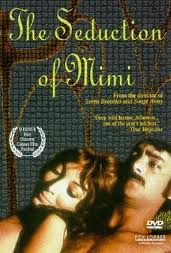
MIMI METALLURGICO (MIMI, THE METALWORKER)
Italy, 1972, 110 minutes, Colour.
Giancarlo Giannini, Mariangelo Melato.
Directed by Lina Wertmuller.
Mimi Metallurgico (Mimi, The Metalworker) is a Lina Wertmuller socio-political comedy-drama predating Seven Beauties and Swept Away. She uses many of the same cast, especially Giancarlo Giannini who is totally convincing as the Southern peasant worker enmeshed in the seemingly unchangeable conventions of Sicily, set adrift in the industrialised North, succeeding by native cunning and returning home with opened eyes and closed conscience. The atmosphere of Sicily is vividly portrayed, the consistency of its standards (so odd to the outside observer) and the exploitation of Sicilians by the far wings of political left and right. The film works very
well as character study, social document and political tract.
1. The films of Lina Wertmuller? The feminine point of view on Italy, its history, politics? The left-wing look at these issues? Her prominence during the '70s? The place of this film in her series? Her use of Giancarlo Giannini in her films? The variety of his roles in presenting the Italian male?
2. The impact of the film for Italian audiences, non-Italian audiences? The social awareness, social criticism, the presentation of the people, customs, Sicily? Politics, socialism and capitalism, communism?
3. The contrast between southern Italy and the north? The opening sequences and the workers, the type of work, the way of life, old traditions? The transition to Turin and the smog, the traffic, Mimi lost? The smoothness of operations in Turin compared with organisation in the south? The transition at the end of the film to a changed south, modernised, industrialised? The visual presentation of Italy, the ironic presentation?
4. The significance of the title? The focus on Mimi himself, his nickname, as a metalworker? The full title showing him betrayed in his honour? His betrayal from his point of view, his attitude towards betraying others. Betraying his wife? The ironies and implications of the title?
5. The portrait of Sicily at the beginning, poverty, work, the workers, political influence, elections? Family life, squalid conditions, people dressing in black etc.? The role of men e.g. the old man being waited on by the women of the family? Mimi and his strutting around? His influence on the boys of the family? The elections, the votes, the discussions about the elections? Husband and wife relationships, sexuality? The influence of the Church? Audience expectations about an exploration of social conditions in Sicily?
6. The Mafia and the connections in Sicily? Family connections? The contrast with the communists and their propaganda? The work with the sulphur? The votes, the free votes, everybody knowing how others voted, Mind betrayed? His decision to move north?
7. The irony of the conspiracy of the people with the three moles on their faces, the zooming in on these moles and the musical accompaniment? The various people involved in the conspiracy ? Mafia, industrialists, bullies, the Church? The control and conspiracy as seen by Mimi everywhere?
8. Giancarlo Giannini's performance as Mind? Presence, appearance, way of speaking, mannerisms? As an Italian type, Italian male, Sicilian? His place in the family? Male arrogance, tradition?
9. The contrast with his wife, her submissiveness, her fear of sexuality, her prayers? Her attitude towards him and his going away? The ironies of her ignorance and the changes while he was away?
10. The film's comment on work and workers, Mind being sacked because of the votes?
11. The visual change to Turin and the spirit of the north? Mind as lost in the north? The contrast with the two worlds and the comment on Italian social conditions?
12. Mimi Is finding work in the north, the building industry, the bosses, the unions, the accidental death after the jokes, the cover-up, the way of cover-up by taking Mimi out onto the highway, the various implications and the massacre, Mimi's witnessing of it and his almost dying?
13. The massacre and the protection, the family connections? The change in Mimi, his allowing himself to be seduced by capitalism and the intrigues of the
north? The effect on him as a person? His mouthing old principles but his behaviour contradicting this?
14. How attractive a woman was Fiore? Her place in the north, her love for Mimi, the liaison? The strengths of her character, influence on him? The birth of their child and the effect on Mimi, the doting father who wanted his child to have everything? Her politics, the left? Her attitude towards love, sexuality, family ? the contrast with Rosalia?
15. The build-up to his return, his unwillingness, his having to go back quietly, bringing Fiore and the child? His cover up? The discussions about his behaviour, the friends taunting him with homosexuality? The ironies of the truth and the way that he revealed it boastingly to them? The comments on Italian male values?
16. Mimi at work in the south, his changed attitudes, his being the overseer? The Mafia links?
17. His life within the family, his running from Rosalia to Fiore, his exhaustion? His keeping up appearances?
18. The impact of the news about Rosalia's pregnancy, the way that he was told, the melodramatic reaction, his rushing home and his violence towards her? The change in her, change of dress, dancing, the story about the policeman and the licence tests? The irony of his treatment of her and his own behaviour?
19. The build up to his revenge on Rosalia and Amilcare? His seeking out Amalia? Her appearance, size? The comedy and farce in the suave Sicilian seduction of Amalia? The pursuit of her, his words, the locations to which he took her? The room and her succumbing? The irony of the sexuality with the close-ups of her flesh, her being so large and fat? The sexual relationship? Her hurt at discovering the truth? Her complicity in the plan and her demands on him? The build up to the pregnancy, the birth of the child? The irony of the confrontation of the two couples and the situation of the children? The Sicilian way of solving things with the shooting? The effect on them all.
20. Mimi at the end and out in the middle of the desert location, alone? What had happened to him? What had he achieved? A perceptive allegory of social conditions in Italy?
Published in Movie Reviews
Published in
Movie Reviews
Tagged under
Saturday, 18 September 2021 19:28
Mildred Pierce
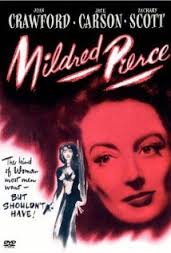
MILDRED PIERCE
US, 1945, 115 minutes, Black and White.
Joan Crawford, Jack Carson, Zachary Scott, Eve Arden, Ann Blyth.
Directed by Michael Curtiz.
Mildred Pierce is romantic melodrama, 1945 style and account has to be taken of the styles of the times, which are probably too much for our tastes. This was the famous role that won Joan Crawford an Oscar for the Best Actress of the year. She combines her energetic role with some sympathy, often missing from her extraordinary dominating roles as in Harriet Craig (1950). Ann Blyth gives an unusual performance as the completely spoilt and vicious daughter. Although dated in many aspects, it is worth looking at.
1. How would you classify this film ? drama, melodrama, soap-opera? Why?
2. What role did the structure of the film play? The nature of the flashbacks? Were they just routine or did they serve to heighten the drama and the mystery?
3. How effective was the opening with Monty being murdered and the suspicious actions of Mildred? Did the association of the death, Mildred thinking of suicide (why did you think, at the opening, that she was committing suicide? Was it the actual reason?) make you think that Mildred had done the murder?
4. How strongly drawn in the film was the character of Mildred? Did Joan Crawford play her sympathetically? What traits of character did you like about her? What incidents in the film highlighted these? How?
5. What were your first impressions of Wally? Why? Did they change? Why did Mildred lead him to the beach house? Did she hope he would be charged with the murder?
6. Why did the Pierce's marriage break up? Could it have been saved? What role did the daughters have in the marriage? What indicated from the start Mildred's love for her children? Was her husband a bad man or a weak man?
7. How was Mildred built up as a resourceful woman, especially in her setting up of the restaurants? Was this success overdone in the film or presented convincingly?
8. What were your first impressions of Veda? What of the scene where Veda despised her mother for waiting at tables but was happy at the thought of owning restaurants and being rich?
9. Was Veda a plausible character? Did Ann Blyth communicate a mixture of girlishness and wilfulness convincingly? How spoilt was she? How much was her mother to blame for this?
10. Discuss the relationship between Mildred and Veda, its strengths and weaknesses, the results of Veda's life, her contradictions? the flirting with Monty, borrowing money, her birthday presents, the marriage swindle, her wanting to get away from her mother, her singing and dancing, the final deceit and murder. Did you ever suspect her of the murder during the film? Why?
11. Why did Mildred take the blame for the murder? Why did she keep spoiling Veda ? for Veda's or for her own sake? What future did Veda have ? "I'll get by"?
12. Was Monty a credible playboy? Did he have any feeling at all for Mildred? He spoke of having pride. Did he really have any? Why did he allow Mildred to marry him? Why did he flirt with Veda?
13. The film was originally a box office success in the mid 40's. Can you see why?
Published in Movie Reviews
Published in
Movie Reviews
Tagged under
Saturday, 18 September 2021 19:28
Milagro Beanfield War, The
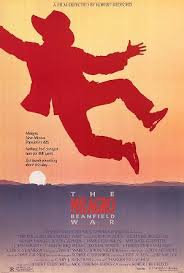
THE MILAGRO BEANFIELD WAR
US, 1988, 117 minutes, Colour.
Ruben Blades, Richard Bradford, Sonia Braga, Melanie Griffith, Christopher Walken, John Heard, James Gammon, Julie Carmen, Daniel Stern, Chick Vennera
Directed by Robert Redford.
The Milagro Beanfield War is based on a celebrated American novel by John Nicholls. Nicholls collaborated on the screenplay with writer David Ward (The Sting, Cannery Row). The film was directed by Robert Redford, his first directing job since Ordinary People, 1980.
The film is an attractive fable about Hispanic workers and development in a New Mexico valley. The water is diverted towards the new resort being developed. A farmer uses some of the water for a beanfield. There are clashes in the town, politics enters, the law.
While the film works on a realistic level, it is also a religious fantasy with an old man who sees visions but offers wisdom to the people as well as a character called The Coyote Angel who appears, helps the people, argues with the old man, does a little dancing.
The cast is excellent, an ensemble of actors and actresses from a wide background. Redford has them working together as an impressive ensemble. The New Mexico locations are Interesting and attractive, there is also an attractive score by Dave Grusin (On Golden Pond). An optimistic fable.
1. A social fable? Mystical and religious overtones? Relevance to the United States? Universal message?
2. New Mexico locations, the town of Milagro, the fields, the beauty of the valley and the hills, the small town, the large area, change? The score and themes?
3. The prologue and the dance, the old man and his getting up, 'Thank you God'? The angel and the town dying? The pig? The sheriff? 'Something about this day'? The general store, the bulldozer, 'Miracle Valley,' the future, the investors' party?
4. Joe and his being too tired to work, busy, broke, a father, the children, his relationship with his wife, no work, the water diverted, the old man and the beans, his becoming determined, not getting any credit from the store, discussing with his wife, the beans, sowing them, diverting the water, the attacks? The pig? The money and the job offer? Herb and his offering accommodation for him, their working together, talking? The shots and the sabotage? The meetings and his desperation? Ruby and Charlie Bloom taking up his cause? Clash with his wife? The shooting of the pig, of the old man? Fleeing? Pursued by Montana? Found by Shorty? His return, the vindication, the collecting of the crop? The symbolism of the little man?
5. The old man and his life, wisdom, veneration of the saints, the traditions, the angel in his life, their conversations, his love for the pig, observing all that was going on, the gun and the shots, his good aim, the sabotage? Herbie, friendship, the tapes and his wonder about the recorder, taking a stand, the gun, being injured, the people waiting in vigil, his strength and living, the final dance?
6. The angel and the old man, the Coyote Angel and his observation, dance, scattering the papers all around the town, his conversation, swearing, his comments, urging people on, the happy ending, Milagro meaning miracle?
7. Ruby and her work, at home, proud of Joe, taking a stand, going to visit Charlie, the argument about the article, the paper, the dispersing of the papers, the tricking of Charlie into the meeting, her forcefulness, going to visit Charlie (and the woman present), the vindication of her stand, a leader in the town?
8. Charlie and his retirement, past career, living a life of quiet, his partial failures, the pressure, Ruby's visit, the paper, writing the article, the distribution of the paper, tricked into going to the meeting, his anger, his clash with Montana, becoming Joe's lawyer?
9. The sheriff and the police, their relationship with Devine, the question of elections, taking sides, Montana's arrival, supplying information, watching the townspeople, going to the meetings?
10. Herbie the outsider, his study, no accommodation, Joe's help, his shed, the old man and his warnings, the snake and the spiders? The old man and talking, taping? The study and his experience, the work, the pig, shooting, his concern?
11. The mayor and his connection with Devine and the police? Trying to keep the peace?
12. Montana and his being deputised, wanting the old car, bashing the car, his stance, Devine and the challenges, tough attitudes, pursuing Joe into the hills, Shorty and the end? His anger with the sheriff and the stand taken? Orders from the capital, his final smile?
13. Devine and his plan, wealth, his friends, the golf course and the resort? The sabotage, the shootings? His wife and her presence, observing what was going on, the easy life? Shorty and the workers? The social stance? Losing?
14. The governor and his advisers, the moneyed interests, discussions, the law, Montana, changing stances because of the protest?
15. Hispanics and Americans, developing of New Mexico, the land, the law, poverty, futures? The taking of the stance by the little man and its vindication?
Published in Movie Reviews
Published in
Movie Reviews
Tagged under
Saturday, 18 September 2021 19:28
Mighty Joe Young
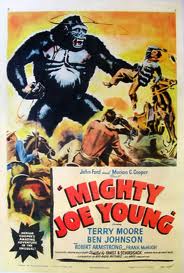
MIGHTY JOE YOUNG
US, 1949, 94 minutes, Black and white.
Terry Moore, Ben Johnson, Robert Armstrong, Frank Mc Hugh, Douglas Fowley.
Directed by Ernest Schoedsack.
Mighty Joe Young is a pale imitation of King Kong. It was made by the makers of King Kong, especially special effects man Willis O'Brien and director Ernest Schoedsack. The young Ray Harryhausen was involved in the special effects. lie was to move on to success in British films in the '50s and '60s including Jason and the Argonauts, The Seven Voyages of Sinbad. The film is a sentimental replay of the King Kong theme, Africa, the loving hero, travel to America. However, the film ends sentimental, rather than in tragedy.
1. The makers of King Kong and their attempt to repeat their success? How effectively? Enjoyably?
2. Black and white photography, studio Africa, Hollywood and nightclubs, the burning building, the musical score?
3. Africa and Jill, finding the gorilla, getting it from the Africans, growing up and its being a pet? Her father?
4. Hollywood, nightclubs and plans, the entrepreneur, Greg and the cowboys, going to Africa, the encounter with Jill, the gorilla? Jill persuaded to go to America?
5. The nightclub, Joe Young's performance, the effect on the audience, on him, imprisoned, the passing of the weeks? The drunks and their taunting him? Breaking out? The uproar in the nightclub?
6. The decision to kill him, the escape, the chase, the importance of the burning orphanage and the rescue of the children?
7. O'Hara, big business, his helping? His assistant? Their watching the home movies at the end?
8. Jill as heroine, nice? Gregg as the strong silent type?
9. The happy ending and the home movie? Popular entertainment of the '40s?
Published in Movie Reviews
Published in
Movie Reviews
Tagged under
Saturday, 18 September 2021 19:28
Midsummer Night's Sex Comedy, A
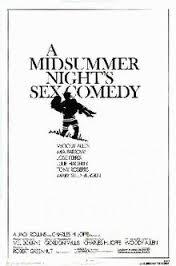
A MIDSUMMER NIGHT'S SEX COMEDY
US, 1982, 88 minutes, Colour.
Woody Allen, Mia Farrow, Jose Ferrer, Julie Hagerty, Tony Roberts, Mary Steenburgen.
Directed by Woody Allen.
A Midsummer Night’s Sex Comedy was one of Woody Allen’s earliest films. After a career in club writing and stand-up comedy, he moved into screenwriting for What’s Up, Pussycat (*? WHAT’S NEW, PUSSYCAT?), 1965. He then appeared in Casino Royale and began directing films with Take the Money and Run in 1970. He made a great impact during the 1970s with such films as Sleeper, Love and Death and won an Oscar for Annie Hall in 1977. Critics were unkind to his more serious film, a tribute to Ingmar Bergman, Interiors. They were also unkind to his tribute to Fellini, Stardust Memories. Manhattan, however, was acclaimed by critics and the public.
Then came this film and, from then on, a film a year for the next twenty-five years at least. He is one of the most prolific of actors and directors.
The film combines in its title the memories of Shakespeare with A Midsummer Night’s Dream as well as Ingmar Bergman’s Smiles of a Summer Night. It is meant to be a film with a light touch – although it touches on many of Allen’s serious themes about the meaning of life and the world. It is strongly influenced by Ingmar Bergman. This is the first film in which Allen appeared with Mia Farrow and was to be followed by eleven more before their acrimonious break-up. This is vintage Allen – vindicated in its reputation after its time.
1. The impact of Woody Allen on American comedy? His success? Cult figure? His style of visual and verbal humour? The pathos of the little man? Reflective humour ? intellectual, philosophical? The strands of the American tradition? Jewish tradition? This film as a cheerful example of his comedy? How typical?
2. The background of Shakespeare and the basic outline of a plot? Summer magic and love? Reality and unreality? Season of love? The emphasis on the dream ? entry into another world? Exploring the psyche via fantasy? The use of dreams in the film, especially Leopold's? The conventions of the sex comedy? French farce, bedroom farce. mistaken identities, compromising situations, truth and lies? The use of Mendelssohn's music? The marriage themes, the Midsummer Night's Dream? The backing for love scenes, comedy, glimpses of nature? The influence of Ingmar Bergman and his Smiles of a Summer Night? The influence of Bergman on Allen? Style, themes, reflection? The blend of these elements? A European type film made and set in the United States?
3. The re-creation of the period: the university, the house, costumes and decor, the inventions, cars? The atmosphere of summer and beauty? The beauty of the collages of summer and nature? The use of Mendelssohn's music?
4. Verbal humour, wit, deadpan remarks, the incongruous, irony, the serious and the glib, the modern language in turn-of-the-century setting? Insight into persons, foibles? Intellectual language, philosophical implications? Psychology? Wit about the emotions, love, lust and marriage? The battle of the sexes, male-female roles? Casanova type?
5. The visual humour, the importance of the editing, ironic editing for one character commenting on another, special effects for the machines?
6. Woody Allen and his anxiety: the metaphysician as projecting his anxieties, the humour about anxiety about marriage, the various crises? Allen's preoccupation with anxiety and his greater calm in this film? The discussions about love and marriage, lust and personal love, passion? Allen's view of the academic world and its pretentiousness and his ability to mock it? His critique of the scientific world - explainers of the Cosmos, not creators? His belief in magic and another world? His personalism, ethical stances, responsibility? Honesty, guilt, forgiveness and healing?
7. The tone of the film with Mendelssohn's music, the focus on Leopold and his impositions on his students, his lecture and its content, his pompous style, science and metaphysics? The students and their reactions? The adulation of the faculty? Autographs and the remark about Carlisle's tomb, Tintoretto? The contrast with Andrew and Woody Allen's appearance, his attempting to fly and his crash? The contrast of the two? Aerial as the link between the two? Leopold and the present, Andrew and the past? The build-up to the clash? Andrew winning in terms of a vision of the world, Leopold losing but gaining insight? Leopold beginning the film with a speech, ending the film with a speech? The contrast of the speeches about science and passion, culture and civilisation and savagery, life and death, a world of the spirit?
8. Jose Ferrer's interpretation of Leopold: pomposity, his status, expertise, his controlling situations even at play, his explanation of meeting Aerial, his disdain of Max, his attraction towards Dulcie, his arranging to meet her and his rationalisation of the affair before his marriage, her beating him at chess, his walk and the encounter with Maxwell, the lies about his behaviour, the dinner talk, his scepticism about the machine, his singing Schubert's songs, his concern about Aerial walking with Maxwell, his explaining his dream to Dulcie, the jokes about the Katzenjammer Kids, his chasing of Maxwell, shooting him with the arrow, drawing blood and becoming savage, the sexual encounter with Dulcie, his death? His being rewarded despite his scepticism! The critique of the academic and pompous intellectual?
9. The contrast with Woody Allen's Andrew: small, balding, looking ridiculous, wearing his modern glasses even in bed, his '70s and '80s style of language? The background of his work and comments on Wall Street? His hobbies and the various machines and their illustration - flying, apple peeling, bone removing, the special globe for the spirit world? His relationship with Adrian and the breakdown of their sexual relationship? The attempts to remedy it? The irony of the truth about her behaviour and his? His anxiety about Aerial coming? Lies? The meeting and her exposing him? The lyrical scenes of play and his involvement - although unsuccessful e.g. with the fishing? His reminiscing with. Ariel and the importance of the lost opportunity, not understanding how he felt at the time? His comments on lust and love? His having to cope with Adrian? Advising Maxwell to visit Aerial at the lake, asking her in his flying machine, the flight and the crash? His lies about the walk? The dinner and his enjoyment of it, Max shooting himself? The listening to Schubert's songs? Max and the midnight walk? His going to meet Ariel, their fight over her? Leopold chasing and firing arrows? The off-screen sexual fulfilment, the on-screen regret and reality? Adrian and his guilt? Adrian and her explaining what happened with Maxwell? The reconciliation? His forgiving and saying he could heal? The little man and his pathos, wit, truth? The creative man?
10. Ariel as the focus: Mia Farrow's style and presence, Ariel's reputation, past meeting with Andrew and its effect on her, her going to marry Leopold and then wanting to get out of it, meeting the group, the recreations, Maxwell's kiss, his harassing her during the songs, her reaction to his shooting himself, the agreement to met, the discussions with Andrew and the reminiscences about the past and its meaning? The truth with Andrew? The arrow and the reconciliation with Maxwell? Her comparisons with Dulcie and her freedom, sharing with Adrian? The zaniness of her life, her feeling she was growing older, wanting to settle?
11. The comparison with Adrian and Mary Steenbergen's fey style: as wife. jealous, frigid, inhibited, worried, welcoming the guests, jealous of Ariel, sharing with Dulcie about sexual techniques, her lies to Andrew about preparing the meal? Her telling the truth, her feeling her guilt going and the reconciliation with Andrew?
12. Max and Tony Roberts' style as the medical Casanova? Seeing him in action with his patient, with Dulcie? His philosophy of life and taking the moment? His enjoyment of the games, love of nature, the walking, the talking, the mushroom episode and kissing Ariel, the walk and encountering Leopold, the lies about the bath, his tears at the meal and shooting himself, his harassing Ariel during the songs, the argument with Andrew over Ariel, the arrow and Ariel's looking after him? His wanting to settle down?
13. Dulcie and her modern style, freedom, knowledge, open talk, sexual lack of inhibition, beating Leopold at chess, smoking with the women, talking to Adrian about sex, the Katzenjammer Kids and Coney Island, the encounter with Leopold and his death?
14. The comic glimpse of the elegantly dressed patient and her liaison with Maxwell?
15. The students and their response to Leopold? The academic group and their flattery of Leopold?
16. The atmosphere with the house, summer, the pastimes and recreations, the meals and the sharing, the songs? Echoes of a civilised time - and the contrast with savagery? So many of the sequences with the group in tableau, walking and talking? The humour of the patterns of the lies about their behaviour in the afternoon?
17. What was the audience left with in terms of comedy, insight, humour and wisdom?
Published in Movie Reviews
Published in
Movie Reviews
Tagged under
Saturday, 18 September 2021 19:28
Midsummer Night's Dream, A / 1935
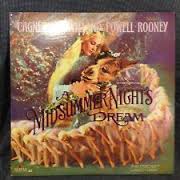
A MIDSUMMER NIGHT'S DREAM
US, 1935, 117 minutes, Black and white.
James Cagney, Dick Powell, Olivia de Havilland, Joe E. Brown, Hugh Herbert, Victor Jory, Mickey Rooney, Anita Louise, Ian Hunter, Arthur Treacher.
Directed by Max Reinhardt.
A Midsummer Night's Dream was one of the earliest sound screen versions, of a Shakespearian play. It was later made by a Russian company, by a Czech company in animated form and by Peter Hall with the Royal Shakespeare Company in 1968. This version is based on a celebrated staging by German director Max Reinhardt. He collaborated with the direction of the film but the main credit is given to William Diertele, who had just come from Europe and was to direct the biographies at Warner Bros of Louis Pasteur, Emile Zola and Juarez, to much critical acclaim.
This version of the play uses many of the contracted players at Warner Bros in the mid-30s. It would not be immediately evident that they would be a cast chosen to portray Shakespeare, for example Dick Powell as Lysander, Anita Louise as Titania, Joe E. Brown as Thisbe (Flute). However, the film works very well indeed and although dated at times, is still an entertaining version of Shakespeare.
Warner Bros gave it the lavish black and white treatment, sets and decor resembling Elizabethan England rather than Ancient Athens, and the star cast. Standouts are James Cagney as Bottom, Victor Jory as Oberon and Joe E. Brown almost steals the show at the end in the performance of the play. The music is by Mendelssohn and by Korngold. The film uses most of Shakespeare's text and is able to do this with pageantry by a great deal of clever trick photography and special effects.
A postscript: a twelve year old Mickey Rooney does quite a good job with Puck.
1. The adaptation of Shakespeare to the cinema screen - the use of Shakespeare's text, visual equivalents, visualising the text? The use of music? Staging and making the staging cinematic? The 1930s treatment here? and the influence of the Broadway production? A successful cinematic presentation of this comedy?
2. The black and white photography, lavish sets and decor? The special effects? The cast and the Warner Bros players of the time? The light touch and the emphasis given to comedy? The use of Mendelssohn's music? The arrangements and music by Korngold? Adding to the style of the film?
3. The reputation of the play: a pageant comedy with the light touch, a gentle fable? The blend of the ancient with the fairy tale and the real? How were these elements captured and blended for the sake of the film?
4. The initial incongruity of Ancient Athens looking and sounding like Elizabethan England? Costumes, choral effects? The presentation of the songs both in the court and by the fairies? A satisfactorily fantasy atmosphere?
5. The framework of the marriage of Theseus and Hippolita? Pageantry, Hippolita's capture by Theseus and the introductory information about the Amazons? The wedding? The four day delay? The preparation of the play? The wedding and the enjoyment of the play? Theseus and the Elizabethan world view orderly rule?
6. The romantic story of Lysander and Demetrius, Helena and Hermia? Their participation in the pageant, their youthfulness, boasts? The rivalry of the men? Hermia as fiery, Helena as wistful? Hermia's father and his insistence on an arranged marriage? The confrontation before Theseus? The arrangements for the meeting in the forest? The chase, the sleep and the potion, the humour of the mix-ups? The fights? The waking and their laughing at what had happened on the midsummer night? The happy ending with the marriage? Quick delineation of character, romantic types?
7. The comedy of the players: the introduction to each of them, the '30s screen comedians adapting to Shakespeare? Hugh Herbert and his laughter, Joe E. Brown and his mouth? James Cagney and his comedy of the pretentious Bottom? The pretensions of the players? The rehearsal and the mix-ups? Verbal and visual humour? The focus on Bottom - his going to sleep, the discovery of the donkey's head, the romance with Titania? His waking and fear that he still had the donkey's head? His relief at the dream? The play itself, the various crises? Audience laughter and Shakespeare's capacity for making an audience laugh?
8. Titania and Oberon and the fairy world? Their flight? Clash? Jealousy over the Indian boy? Oberon's plans and his humiliating of Titania by her falling in love with Bottom? His waking her and the happy ending? The range of fairies with their ballet, singing? The special effects for the fairy world superimposed on that of the real? The poetry of Fairyland?
9. Mickey Rooney's style as Puck? The sprite of the forest? Oberon waking him and commissioning him to spread the potions? His mistakes, his later mischief, his enjoying himself distracting and misleading the romantic characters? His laughter? His poetry and quotes about 'What fools these mortals be?"
10. The speaking of the poetry and its being dramatised? Imaginative, romantic, rich poetry? The songs?
11. The blend of the romantic with the comical? The players and their "tragicall mirthe"?
12. Basic themes of love, jealousy, mistakes, authority, arranged marriages and true love? Blindness and seeing truly? Overcoming pride?
13. A fable for popular entertainment? Themes of who governs whom, fate - but with the light touch?
Published in Movie Reviews
Published in
Movie Reviews
Tagged under
Saturday, 18 September 2021 19:28
Midnight Run
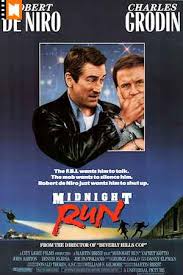
MIDNIGHT RUN
US, 1998, 126 minutes, Colour.
Robert de Niro, Charles Grodin, Dennis Farina, Joe Pantoliano, Yaphet Kotto, John Ashton, Philip Baker Hall.
Directed by Martin Brest.
Midnight Run was a comedy hit success of 1988. It is an excellent vehicle for Robert de Niro to show his skill as a comic talent. He is well-matched by Charles Grodin with his extremely laid-back style.(The screenplay is humorous, but relies a great deal on swearing rather than wit, perhaps a style of de Niro's improvisation in comedy.)
The film draws on a great number of American genres: the unlikely buddy, the strange odd couple, the defiant ones handcuffed together, the mishaps in travel with planes, trains and automobiles, the police and FBI chase, Mafia thrillers. It combines elements of each excellently as the screenplay makes its way from New York across America to Los Angeles.
There is a good supporting cast with Yaphet Kotto as an exasperated FBI agent, John Ashton as a slob bail-bond hunter, Joe Pantoliano as a frantic bail-bond boss, Dennis Farina as the Mafia chief.
The film has more to say than the usual comedy of this kind - mainly because of the strength of the two central characters, their interactions. Direction is by Martin Brest (Going in Style, Beverly Hills Cop).
1. Successful adventure comedy: buddies movie, a new Defiant Ones, a new Odd Couple, Planes Trains and Automobiles, Mafia? Police chase?
2. A piece of Americana: from New York to Los Angeles, by train, plane, car, bus, walking? Ohio, Chicago, Amarillo, Arizona, Las Vegas and Nevada, California?
3. The importance of the pace, the editing? Stunts and chases? Musical score and songs?
4. The differing styles of the stars and their forming an effective odd couple? Working well together, improvising? The question of wit and swearing humour?
5. The opening and Jack at work, his bail bond work, capturing the criminals, punching Marvin to distract him? Relationship with Eddie, his office, the job?
6. Jack and the offer of $100,000 to go to New York and get the Duke? Mosley and the FBI warning him off, his joking with them, taking Mosley’s identification? in New York and rapidly finding the Duke: the tap on the phone, discerning the phone number, the address, arresting him, despite the dog?
7. The introduction to the Duke: the story of his job, taking the money, millions to charity, as a type and personality, the accountant, quiet, his ingenuity?
8. Jack taking him to the plane, the Duke realising he was not FBI? The enjoyment of the tantrum about not being able to fly? Transition to train, the Duke in the toilet, the arrival of Marvin, trying to take the Duke, Jack defeating him?
9. The phone calls to Eddie, Eddie and his exasperation, Jerry listening in, going for doughnuts and ringing the Mafia? The FBI tapping the phone and informed? Eddie and his double-dealing and getting Marvin to go on the job?
10. Interviews with Jack, chasing him, interviews with Marvin and taking his cigarettes, exasperated, following the trail, the helicopter, the final deal with Jack, his nervy waiting, ultimate success? The irony of Jack using his identification?
11. The ride on the bus, the serious talk between Jack and the Duke, the explanation of the watch, the story of Jack's wife, Chicago and the heroin dealer? The arrival and the gunfight at the terminal? Jack and the Duke getting away? The decision to go and see Gail, seeing her after nine years, the story, her marriage, police corruption? His absence? Seeing his daughter grown tip? Asking for the money, the daughter and offering her baby-sitting money? Gail giving him the car? The later explanation of his place in the Chicago police, the Mafia boss being the reason for his leaving?
12. Hiring the car, the arrival in Amarillo, no breakfast? The thugs catching up and going to shoot them? Marvin's arrival just in time, taking them, the helicopter chase, the dives into the river? Jack defeating Marvin and cuffing him? The FBI catching up?
13. Hitching the ride, the Indians, the Duke trying to take the plane, Jack chasing him? Taking the Indians' truck at gunpoint? The need for money, the Duke's routine about being FBI and the fake $20 bills? Buying the food, jumping onto the train and being seen? The fight between the two, jumping out before the station? Taking the car, the number of police cars chasing, strewn over the countryside? Marvin's shrewdness in waiting, taking the Duke? Jack alone in the middle of nowhere, rescued by Mosley?
14. Phoning Eddie, phoning the Mafia, the plan about the cassette, the deal with Mosley, monitoring the situation? Marvin and the Duke in the hotel, taking the photo, the thugs arriving and taking the Duke back? Marvin at the airport and intruding and spoiling the set-up? Jack, discussion with the Mafia chief, the FBI's edginess, Marvin's interruption, the confusion, the satisfactory ending?
15. The sketch of the Mafia chief, his influence in the Chicago police, not being able to corrupt Jack, warning him off? The various legal advisers, the thugs and their following of Jack ? and staring at hint? Their revenge? Jerry in the pay of the Mafia and arrested?
16. Jack getting the Duke to Los Angeles on time, the decision to let hint go? motives? Integrity? The irony of the Duke offering hint the money belt? No change of $1000?
17. Charles Grodin's portrait of the Duke, as an accountant, his discovery, the decision to take the money and give ?*it to charity, self-preservation, his fear of the Mafia chief killing him? he and Jack both victims of the same man? His appeal to Jack for integrity and understanding the situation? His idiosyncrasies, clean living, trying to persuade Jack to live cleanly? Their range of discussions, about Gail, about food?
18. Jack and Robert de Niro's skill at creating him as a human and humane character, idiosyncrasies, perspective, integrity?
19. Law, the police, justice, jobs, money, ethics and integrity, the blend of comedy and adventure?
Published in Movie Reviews
Published in
Movie Reviews
Tagged under
Saturday, 18 September 2021 19:28
Midnight Express
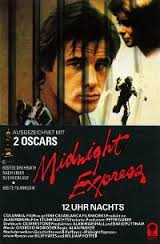
MIDNIGHT EXPRESS
UK, 1978, 121 minutes, Colour.
Brad Davis, Randy Quaid, John Hurt, Irene Miracle, Bo Hopkins.
Directed by Alan Parker.
Midnight Express is, unfortunately, not an unusual story of the '70s, the young man travelling, tempted to make some quick money by drug-carrying episodes. Turkey and its foul prisons and brutal treatment is the setting, but by amplifying some of the incidents in the real Billy Hayes experience, the film highlights the widespread cruelty in the treatment of internees, justly or unjustly, in jails world-wide. The cumulative effect of the experience is a scene of savagery rarely seen and which I, for one, empathised with in a frightening way. The degrading of an average callow young man is supported by the excellent performances of Randy Quaid and, especially, John Hurt. Many Oscar nominations in 1978. Director Alan Parker's credits include Bugsy Malone and Fame.
1. Did the film deserve the acclaim it received? Numerous awards? Oscar nominations? The film was also condemned by many reviewers and audiences, especially because of racist and anti-Turkish comment. Did it merit this condemnation?
2. The film was based on a true story. It differed from the original story. It was considered to have sensationalised some of the incidents and made them more violent. Is this true? The difference between the written medium and the visual medium? Audiences identifying with Billy Hayes, responding to his plight? The atmosphere of Turkey in the 170s, United States relationships with Turkey? The authentic atmosphere of the story, dates, places? The background of President Nixon's policies?
3. The film reflecting the drug trafficking of the 1960s and 70s? Large scale trafficking, small scale? International difficulties and policing? Turkey and drug traffic? The Turks and xenophobia? The comments on the Turks making scapegoats of particular victims? Is this true of Turkey, of other countries?
4. The themes of justice: the nature of a crime, the responsibility of the criminal? The criminal not being able to be excused basically from his crime? The nature of punishment? Punishment as proportionate to crime? The role of the courts and the application of the law? The courts not being concerned with morality? The relationship between law and its administration and justice? How well did the film portray aspects of the relationship of crime and punishment? The effect of prisons on people? People's lives being consumed by time in prison, punishment, humiliation? The portrayal of excessive punishment as regards prisoners' rights? The repercussions and the responsibility for the administration of justice?
5. The film's presentation of Turkey and the Turks? How anti-Turkish was it? Billy Hayes' angry statements in the court scene? The comments of the other prisoners? Were they merited or not? The application of these comments to universal prison systems which dehumanize their prisoners?
6. How authentic was the atmosphere of the film? The style of photography, giving an atmosphere of audience being present during the imprisonment of Billy Hayes? Editing, pace? Maltese locations and Turkish inserts? The setting of the prison? The portrayal of violence? The special effects especially for portraying the atmosphere of violence? The contribution of the musical score: the basic them, the variety of instruments, the portrayal of tension through musical background?
7. The introduction to Billy Hayes, an ordinary callow young American, the light and darkness with which he hid the drugs? How did he present himself as a person, tension, sweat? With Susan and the airport? The dark glasses, jeans, gum-chewing young American student? His fear at the airport, the encounter with the customs men and the problems of language? His visiting the toilet and his tension? The bus and his searching for his passport? The sudden discovery of the drugs, the pulling of the guns, Susan watching? The build-up to justice for his crime? A person who has committed a crime and a person who is to be punished? The background of his one crime, his greed, easy money, callow approach?
8. How did the film build up its atmosphere with the interrogations, the photos and the police taking credits, their arguments about responsibility? The American and his presence with the Turks? His persuasiveness and overtures of friendship to Billy? Persuading him to search out the taxi driver who supplied the drugs, the sequence in the cafe? Billy's running, the atmosphere and tension of the chase, Billy's sense of escape and his suddenly being caught by the American with the gun? The futility of trying to run away?
9. Billy's personal response to his crime and imprisonment? The device of his letter to his father to give the atmosphere of the crime, his humiliation, the hurt to his parents? The later device of the letter to Susan? His father's visit and the loving bond between the two? Billy being sincere? His father and his anger and resentment and sorrow? Filling in the background of his family - and the picture of Billy as an ordinary young American? The Turkish lawyer (how fair was the film to have him so fat, obsequious, even nose-picking, searching for every opportunity to get money?), the consul and his ineffectual help? Billy and his wearing the suit, going into the court, his presentation of himself, the prosecutor and his intensity, the judges and their sympathy, the lawyer? The heavy sentence and the effect on Billy?
10. Our introduction to the prison with Billy? The appearance of the officer in charge with his baton, size, humourlessness? The introduction to Rifki and his obsequiousness, his appearance, his wanting money? A sinister presence and the object of hatred by the prisoners? Billy and his being cold, getting the blanket, the punishment and the bashing of the soles of his feet and his being hung up? As he recovered his getting to know Jimmy, Eric, Max? The various prisoners? The portrait of the prison itself?
11. Comment on the film's presentation of detail of prison life - the cells, washing facilities,' recreation, meals? Exercise? The enclosed atmosphere, the reasons for people being there? Billy's comments on the prisoners, drug pedlars, homosexuality? The fights in the yard and the stabbings? Max and his cat and Rifki killing it? Scenes of talking, exercising, the bonds that grew up between the prisoners?
12. The portrait sketch of Jimmy? An ignorant and naive young American, his robbery, his rough reaction to the prison, hernia, violence, being slashed, the desperate need to escape, his being shot, the infirmary? His scheme for digging out of the prison? The enthusiasm of the digging, the frustration of not getting out, his being singled out as responsible and his being bashed? A portrait of a prisoner? Audience interest, compassion?
13. Eric, Swedish, drugs? Gentle? His care for Billy? Exercising together? The homosexual overtones? Billy's rejection of the relationship? His care for Eric?
14. The portrait of Max - as an Englishman, a long sentence, partly mad? His knowledge and experience, advice about lawyers? The quality of John Hurt's performance? Appearance, manner, weakness, helping? The cat and its death? His participation in the digging plan? His being singled out and his going mad? In the mad ward and his withdrawal? The wreck of the human being by prison? The scenes of his advice and dialogue where he had insights? The destruction of this?
15. The sketch of the lawyer and his greed, his reopening of the case, his wanting money to effect an escape? Billy's condemnation of him in his final outburst? The consul and his not being able to do anything? The 53 days and its frustration? Billy's angry speech in the court? the valid points, the anger? His being good and the frustration and the impulse not to be good any more because there was no reason?
16. The change of atmosphere and the attempts to escape? Jimmy and the blueprints? Billy in charge of the attempt to escape - the exhilaration of finding the opening, frustration and the return? Meantime the background of the officer in charge and his brutality e.g. having his fat sons watch his bashing the soles of young boys? Rifki and his ever-watchfulness and the others loathing him? The revenge on Rifki and his money being burnt and the effect on him? Max as being victim of this? The build-up in Billy for his frustration, life imprisonment, the treatment of Jimmy, Max? Rifki and his place and Billy's going berserk? The presentation of Billy's berserk violent scene as violent cinema? The physical intensity, the way it was filmed, his frustrations, the bashing of Rifki and the final biting of his tongue with the close-up of Billy's face with blood and animal-like expression? Audience identification with an horror at this violence?
17. The transition to the mad ward and the criminally insane? The range of types there, the old men and the young, vacant minds and faces, sexual preoccupations? The circle and everybody moving from right to left? The educated man and his insanity and talking with Billy? The allegory of the bad machines? Billy and his confrontation of the man and his power over him in saying that he made the machines? Susan's visit within this context? Her grief at seeing him, his degradation, madness, filth? The importance of the sexual frustration? The photo album and the money? Billy being able to move himself to some kind of activity through this visit of Susan?
18. The build-up to his escape, his trying to bribe the officer in charge who took him out, the preparation for a rape. the accidental violent death? Billy's tension and the irony of being able to escape because of the officer, changing uniform? The tension of his walking down the stairs, getting the key. passing the other police, freedom on the street and his leap of joy? The photo collage as rounding out his escape?
19. How well could audiences identify with the personalities, the events, the situations? The highly emotional response? Themes of justice, prison, violence?
20. Insight into human life, crime, the values of society and as exhibited by their prisons? This story altering attitudes towards crimes and proportionate and disproportionate punishments?
Published in Movie Reviews
Published in
Movie Reviews
Tagged under
Saturday, 18 September 2021 19:28
Midnight
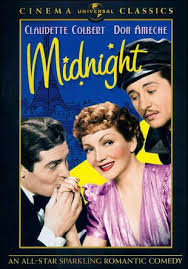
MIDNIGHT
US, 1939, 95 minutes, Black and while.
Claudette Colbert, Don Ameche, John Barrymore, Francis Lederer, Mary Astor, Hedda Hopper.
Directed by Mitchell Leisen.
Midnight is a very entertaining example of '30s comedy which is often characterised as 'screwball, sparkling.' it has great strength in its cast, with Claudette Colbert at her most vivacious. There is also an enjoyable performance from John Barrymore with his eyebrows almost continually arched. Mary Astor is also good, as is Don Ameche as the hero. Francis Lederer portrays a dashing Frenchman and Hedda Hopper has an opportunity to he a scatty Arterican hostess in Paris who goes shopping for hats.
The plot is implausible, is a variation on the Cinderella theme and its coming close to midnight. The screenplay was written by the team of Hilly Wilder and Charles Brackett before Wilder moved into his most successful directing and writing career. Direction is by Mitchell Leisen, director of many of such comedies and dramas during the later '30s and into the '40s.
1. An acclaimed popular comedy of the 30s? Comic style, sparkle? The humour, the irony? The stars? Wilder and Brackett as writers?
2. American studio sets version of Paris, black and white photography, the world of the taxi drivers, American society in Paris? Musical score?
3. The frothy plot, the high society ingredients, farce, mistaken identities, romance?
4. Eve Peabody and her arrival, dress, on the train, the porter and her luggage? meeting Tibor, the rapport between the two, his helping her in job hunting, the collage of job seeking? His offer, her running away? Discovering the soiree, using her pawn ticket? George and his eyebrows? Stephanie and her letting the card? Going to play Bridge, interaction with the group, her losses, George putting money in her purse? Her manoeuvres? Jacques going back to the hotel? Finding rooms, luggage, chauffeur? The deal with George to lure Jacques away from Helene? Her sequences with Jacques and his falling in love with her? The trip to the hat shop, buying dresses, going to the country estate with Jacques? The arrival, social graces, meals? Marcel and his wanting to expose Eve? Tibor and his arrival, declaration of love? Saving the situation? The night and their argument, the next morning? Breakfast and the story about Francie being ill? Her telling the group that Tibor was mad and their reacting accordingly? The divorce court, the happy ending? Love, possibilities, change?
5. Tibor as the gracious taxi driver, helping Eve search for jobs, offering her accommodation? Losing her, giving the money to the cabbies for the search? The truth and his reaction, his arrival just in time, carrying off gracious husband and the count, helped by George, with Eve in the evening, the morning, the invention about Francie, the phone call, his trying to persuade then of the truth and they believing he was mad? The divorce court, his reaction, love for Eve?
6. John Barrymore's style as George, his ability to look askance, working out what happened to Eve, her purse, giving her the money, the apartment? The deal? Their collaboration and timing? His love for Helene? The comic sequence with him on the phone as the child and mother? Reconciliation?
7. Helene, her love for her husband, the infatuation with Jacques? With Stephanie, at Simone's? Making inquiries? Her jealousy, Marcel and the expose? The reconciliation?
8. Marcel, insinuating himself to parties, the gossip, the expose?
9. Jacques and his wealth, the man about town, relationship with Helene, falling in love with Eve? Enjoying her company? Bewildered, in court?
10. Stephanie, her soirees, not knowing what pieces were being played, hats ? and the irony of Hedda Hopper playing the role?
11. High society and its style, wealth, meals, social gatherings? The contrast with the world of the taxi drivers?
12. A frothy blend of intrigue, innocence and romance?
Published in Movie Reviews
Published in
Movie Reviews
Tagged under